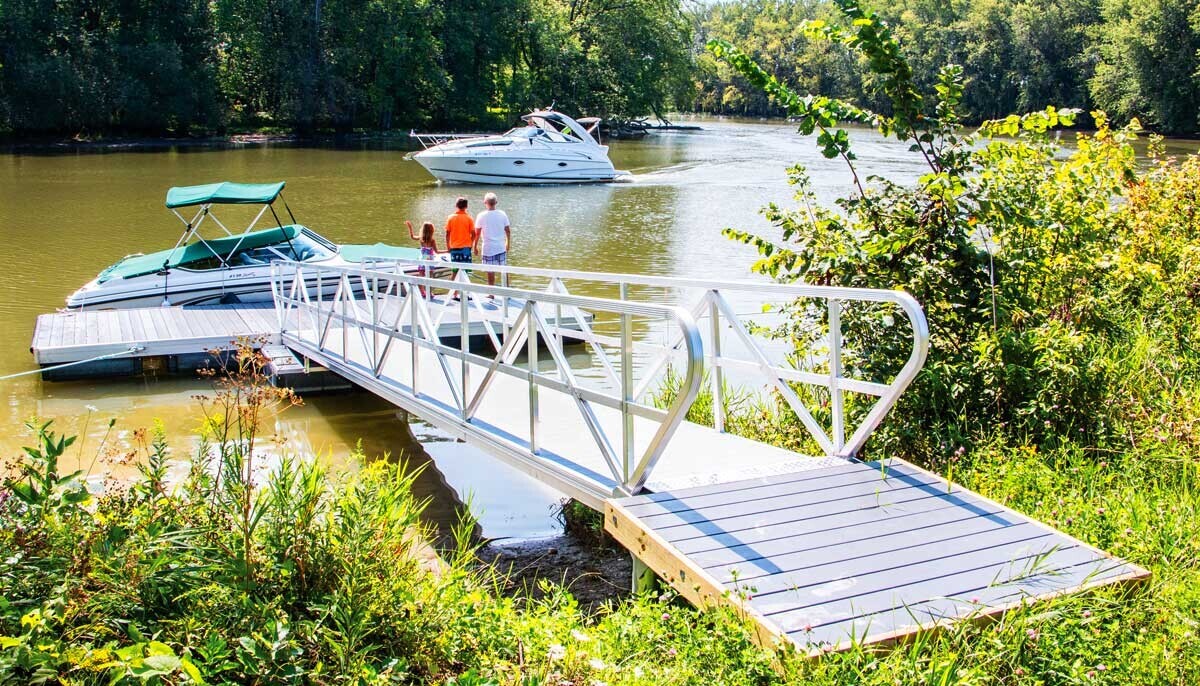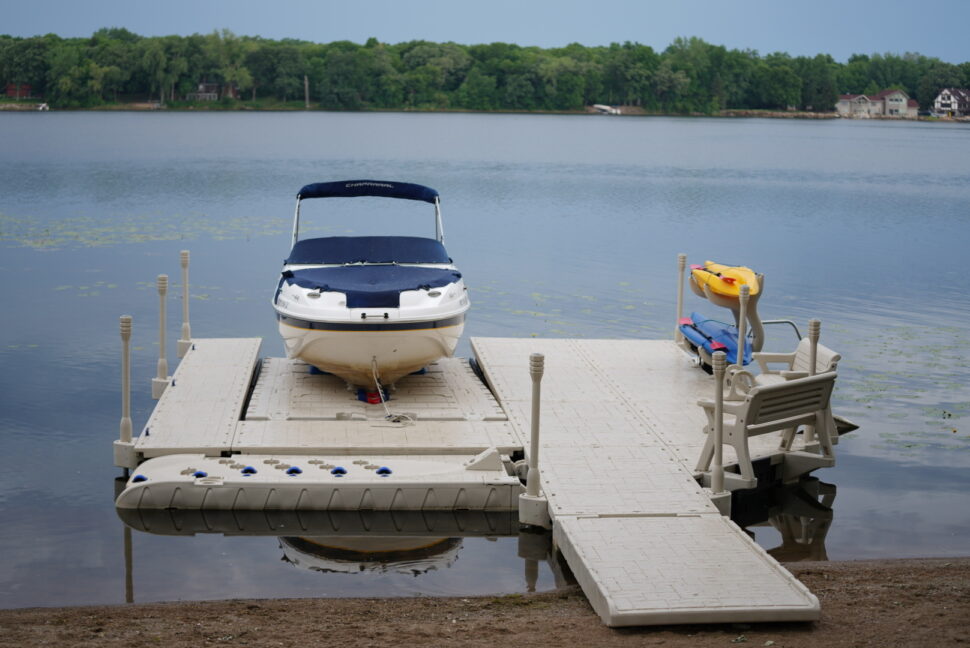Top Reasons to Partner with a Reliable Floating Dock Company for Your Next Venture
Top Reasons to Partner with a Reliable Floating Dock Company for Your Next Venture
Blog Article
Why Floating Docks Are the Perfect Service for Your Waterfront Needs
Floating docks present an engaging solution for waterfront requirements, especially because of their versatility to varying water levels and their durable, modular layout. These structures not only enhance functionality for both business and leisure functions but additionally offer customization alternatives tailored to certain needs. Their eco friendly products add to sustainability efforts. As we discover the diverse benefits and applications of floating docks, it ends up being apparent why they stand out in the world of waterfront framework-- especially when thinking about the lasting benefits they attend to different stakeholders.
Key Advantages of Floating Docks
The flexibility of floating docks offers various advantages for waterside applications, making them a significantly popular option among marina operators and building developers. One of the main benefits is their versatility to changing water degrees, which enables them to continue to be useful in numerous settings, consisting of lakes, rivers, and seaside locations. Unlike standard set docks, floating docks can fall and rise with the tides and seasonal changes, making sure regular access.
In addition, floating docks are normally much easier and cheaper to set up and maintain. Their modular layout assists in quick assembly, reducing labor prices and building and construction time. In addition, the products utilized in floating dock building and construction are usually resistant to rust, making certain longevity with marginal maintenance.
Safety and security is one more key benefit; the buoyant nature of these docks lessens the risk of crashes during boarding and getting off, making them particularly appealing for family-oriented centers. Their environmental impact is reduced than that of set structures, as they do not interfere with water ecosystems. Jointly, these benefits setting floating docks as a remarkable remedy for a variety of waterfront requirements, straightening with both operational performance and environmental factors to consider.
Ideal Applications for Different Tasks
Versatility is a characteristic of floating docks, making them appropriate for a wide variety of activities across numerous waterfront settings. These functional structures can function as excellent systems for entertainment tasks such as boating, angling, and swimming. Their buoyant nature enables for simple access to boat, making it possible for smooth departure and disembarkation, while also offering a steady location for anglers to cast their lines.
In industrial setups, floating docks assist in the loading and dumping of goods, accommodating both huge and small vessels. They are particularly helpful in locations with changing water levels, making sure that procedures continue to be nonstop. Additionally, floating docks can be used for waterfront dining and amusement, giving a scenic and one-of-a-kind experience for customers.
Environmental applications are also remarkable; floating docks can work as monitoring systems for wildlife viewing or as docking stations for research vessels participated in eco-friendly researches. As marina expansions end up being a lot more common, these docks provide a useful solution for increasing capacity without substantial land modifications. Eventually, the flexibility of floating docks makes them a favored choice for anyone looking for useful and effective waterside options.
Style and Personalization Alternatives
Floating docks not just provide to diverse tasks yet also supply a series of design and customization alternatives that improve their functionality and visual appeal. These functional frameworks can be tailored to fit particular waterfront demands, whether for property, commercial, or entertainment purposes.
One trick element of modification is the option of materials. Choices range from high-density polyethylene to light weight aluminum, each supplying unique advantages in regards to durability and maintenance. In addition, the setup of the dock can be adjusted to fit numerous water levels and ecological conditions, ensuring stability and security.
Design functions can consist of integrated seats, barriers, and lighting, which not just improve functionality but likewise enhance the appearance of the dock. Personalized colors and surfaces permit owners to match the dock with existing structures or individual preferences, creating a cohesive seek the waterfront.
Moreover, floating docks can be designed with modular areas, making it more information possible for simple development or reconfiguration as needs alter. This adaptability is particularly important for expanding family members or evolving companies. In general, the extensive style and modification alternatives available make floating docks an extremely adaptable option for any type of waterside setup.
Installment and Upkeep Factors To Consider
Typically, successful installation and maintenance of floating docks require careful planning and focus to information. Prior to starting setup, it is necessary to analyze the details website problems, consisting of water deepness, wave activity, and regional policies. This initial evaluation informs the choice of products and layout, making certain the dock will certainly stand up to environmental tensions.

Upkeep is equally crucial to prolong the life expectancy of the dock. Regular assessments ought to be conducted to recognize wear and tear, especially on flotation protection devices, adapters, and decking. Cleaning up the dock occasionally helps stop the build-up of algae more information and debris, which can jeopardize surface honesty and appearances.
Additionally, seasonal preparations, such as getting rid of devices and securing the dock during severe climate, can prevent damage. By focusing on correct installation and routine maintenance, owners can ensure their floating dock continues to be a useful and reliable waterfront service for many years ahead.

Ecological Influence and Sustainability
The ecological influence of floating docks is a crucial consideration for waterfront tasks, as these structures connect straight with water communities. floating dock builder. Unlike traditional set docks, floating docks reduce disturbance to the substratum, enabling all-natural sediment activity and minimizing erosion. Their layout permits water flow underneath, promoting healthy and balanced water settings and supporting local wild animals
Many floating docks are constructed from lasting materials, such as recycled plastics and eco-friendly compounds, which decrease the carbon impact related to production. Contemporary designs integrate functions that boost ecological sustainability, such as permeable surfaces that promote water filtering and decrease pollution.
Floating docks additionally provide an excellent platform for habitat repair by sustaining the growth of aquatic plants and offering sanctuary for fish and other aquatic microorganisms. By including features like fish habitats and immersed growings, floating docks can boost biodiversity in the area.
Additionally, these structures can be created to suit photovoltaic panels, providing renewable resource choices that better lower their ecological impact (floating dock services). On the whole, floating docks stand for a lasting remedy that stabilizes human use beachfronts with the conservation of vital communities
Final Thought
In final thought, floating docks present a lasting and very versatile option for varied waterside requirements. Their modular style, paired with making use of long lasting, corrosion-resistant materials, guarantees durability and ease of maintenance. The versatility of floating docks fits various applications, varying from entertainment tasks to industrial operations while minimizing environmental influence. Ultimately, the customizable attributes and capacity for expansion further solidify floating docks as an optimal selection for any waterfront job.
Floating docks present a compelling solution for waterside needs, especially due to their their explanation versatility to varying water degrees and their robust, modular layout. Unlike conventional set docks, floating docks can fall and increase with the trends and seasonal modifications, ensuring constant accessibility.
Jointly, these benefits setting floating docks as an exceptional remedy for a variety of beachfront needs, lining up with both functional efficiency and eco-friendly considerations.
Generally, the extensive style and modification options offered make floating docks a highly adaptable option for any kind of waterfront setting.
Unlike typical set docks, floating docks lessen disruption to the substrate, enabling for all-natural debris activity and decreasing erosion.
Report this page